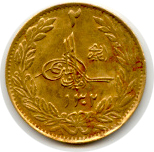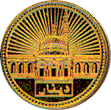"Islam is based on five: testifying that there is no god but Allah
and that Muhammad is the Messenger of Allah, establishing the prayer,
paying the Zakat, the Hajj and the fast of Ramadan."
Zakat cannot be paid with a promise of payment
Zakat can only be paid with tangible merchandise, called in Arabic
'ain. It cannot be paid with a promise to pay or a debt, called in Arabic
dayn.
From the beginning the zakat was paid with dinars and dirhams. Most
significant is that the payment of zakat was never allowed in paper
money during all the ottoman period right until the fall of the Khalifate.
Shaykh Muhammad Alish (1802-1881), the great Maliki Qadi, said
that if you were to pay zakat with paper-money only its value as merchandise
('ayn), that is, its value as paper can be accepted. Therefore, its
nominal value is irrelevant as payment of zakat.
"If the Zakat was obligatory by considering its substance as a merchandise,
then the nisab would not be stipulated according to its value but according
to its substance and its quantity, as is the case with silver, gold,
grain or fruits. Since its substance [paper] is irrelevant [in value]
in respect to the Zakat, then it should be treated as the copper, iron
or other similar substances."
Fatwa of Shaykh Alish
Payment of Zakat is perfectly explained and regulated in the Islamic
jurisprudence. For centuries when Islamic Law was enforced by a Caliph
or an Amir, the Zakat was collected in gold and silver. When paper-money
was being first introduced, during the last century by the colonial
powers the traditional ulema rejected it as being opposed to Islamic
Law. According to them paper money was to be treated as fulus or lower
category of currency with limited used, basically just as small change.
It is, for example, not allowed to make a qirad with fulus. Among those
ulema, stands out the famous scholar of magrebi ascendance, Shaykh Muhammad
Alish (1802-1881) who was the Shaykh of the Shaykhs of Maliki fiqh in
the University of Al-Azhar in Egypt.
He wrote in his Fatwa.
"What is your judgement in respect to the paper with the stamp of
the Sultan that circulates like the dinars and the dirhams? Is it obligatory
to pay Zakat as if it was a coin of gold or silver, or merchandise,
or not?"
I responded exactly in the following way:
"Praise belongs to Allah and blessing and peace upon our Master
Muhammad, the Messenger of Allah."
"Zakat is not to be paid for it, because Zakat is restricted to
the flocks, certain type of grains and fruits, gold and silver, the
value of rotational merchandise and the price of the goods withheld.
What is referred previously does not belong to any of these categories."
You will find an explanation by comparison with the copper coin or
fulus with the stamp of the Sultan which is in circulation and for which
no Zakat is paid since it does not belong to any of the categories mentioned.
It says in the "Mudawwana": "Those who posses fulus for over a year
for a value of 200 dirhams does not need to pay Zakat unless is used
as a rotational merchandise. Then, it should be treated as if it was
a merchandise."
In the "At-Tiraz", after mentioning that Abu Hanifa and Ash-Shafi'i
obliged to pay Zakat for the fulus, [is stated that] since both affirm
that the payment of Zakat is from value, and considering that Shafi'i
has two contradictory opinions about the subject, the opinion of the
school is that there is no obligation to pay Zakat for the fulus since
there is no discrepancies about the fact that what counts with respect
to the fulus is not its weight or its quantity but only its given value.
If the Zakat was obligatory by considering its substance as a merchandise,
then the nisab would not be stipulated according to its value but according
to its substance and its quantity, as is the case with silver, gold,
grain or fruits. Since its substance [paper] is irrelevant [in value]
in respect to the Zakat, then it should be treated as the copper, iron
or other similar substances.
And Allah, ta'ala, is the Wisest. And may Allah bless and give peace
to our Master Muhammad and his family.
(Translated from the "Al-Fath Al-'Ali Al-Maliki" pp. 164-165).
This Fatwa considers paper-money to be fulus, because it only represents
money and does not have value as merchandise. It follows that since
Zakat cannot be paid in fulus, which has no value as merchandise, it
cannot be paid in paper-money, which value as weight of paper is null.
On this basis, it becomes clear the urgent need to restore the use of
the Dinar and the Dirham as payment of Zakat. If the millions of Muslims
who now make their payment of Zakat in paper money would do it in newly
minted Dinars and Dirhams, they will put in circulation millions of
gold and silver coins into the mainstream of daily commercial activities
of our communities. That single act will became the most important political
act of the century, opening the path towards the establishment our own
halal free currency breaking away from the usurious financial system.
The return to the payment of zakat in gold and silver is an essential
part of the reestablishment of Islam.
 THE GOLD DINAR RESEARCH GROUP
THE GOLD DINAR RESEARCH GROUP 